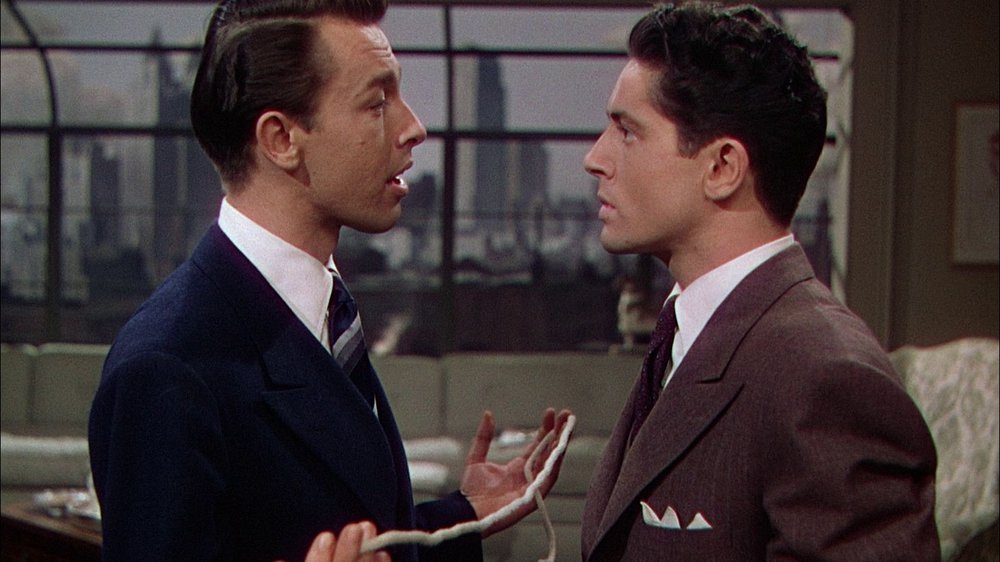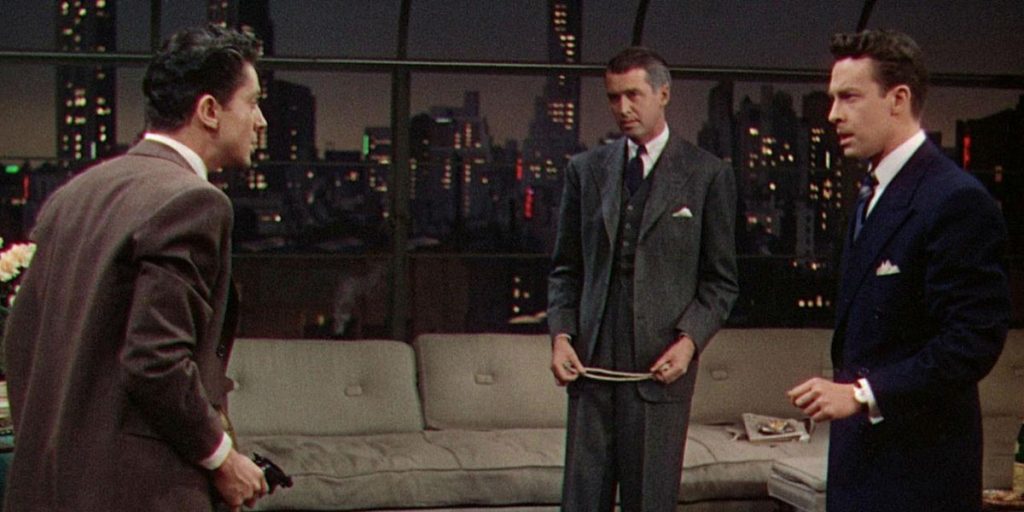With Rope, Alfred Hitchcock flexes his filmmaking muscles and proves that his title as the “master of suspense” is entirely warranted.
Before Rope, murder in movies was often little more than a means to an end. A few shots fired, a dangerous fistfight, or even a meditated act of revenge. But what Hitchcock presents in this psychological thriller is much more precise and thoughtful than that. In fact, the murder in question takes place before the film’s story even begins. Rope follows two lifelong friends who commit a carefully-planned murder in their apartment upon their old school friend, before hosting a party in the very room where his body is stored. Rope exploits every ounce of tension and anxiety from this thrilling premise, using a series of connected shots to place the audience in that room and holding them there as events unfold. Hitchcock once described Rope as “an experiment that didn’t work”, but the film’s brilliance goes much further than its formal and structural experimentations, offering plenty of insightful and revolutionary commentary on crime, morality, and the social instability of America.
The reason that Hitchcock described his film as an ‘experiment’ was due to his use of the ‘one-shot’ technique, which many saw to be an extremely impressive feature that ultimately adds nothing to the story. Many have described its usage as ‘gimmicky’ or ‘shallow’ – but that couldn’t be further from the truth. Whilst it’s fair to say that using one continuous shot might not have been totally necessary, it was still revolutionary for the time and remains crucial to the film’s establishment of tensions and stakes. If the camera had cut away from the apartment for even a second, the whole rouse of entrapment would have been proven futile.
By remaining in one location, and maintaining a continuous flow of time, Hitchcock allows the viewer to feel like they’re truly a part of the story, learning about the characters in real-time and watching our killers break down as they begin to fear discovery. It offers that same kind of audience engagement that you find in theatre, with the single location and limited characters making everything feel much more grounded in reality than most films.
To move on from the film’s technical aspects, Rope also boasts an incredibly insightful and philosophical screenplay that’s often overshadowed by its visual feats. At the heart of the story are two men who believe murder can be justified under the right circumstances – those being that the perpetrators occupy a ‘superior’ sphere of society and the victims an ‘inferior’ one. They believe that since they are highly educated, wealthy, and intelligent, they hold some sort of moral exemption to the crime’s consequences. And they believe that since their victim is less educated, less wealthy, and less intelligent, his presence in the world is less important than their permission to commit murder. It’s an extremely distorted and twisted concept, but the film’s careful screenplay manages to present it in a way that seems logical, if not justifiable. It’s easy to see where these characters are coming from, and how they’ve reached these absurd conclusions, even if it never coerces the audience into agreeing with them.

Unlike many of Hitchcock’s other films, the excitement of Rope doesn’t come from the discovery of a crime, but rather the study of those that committed it. Although there’s definitely a cat-and-mouse chase between the killers and their suspecting houseguests, the audience isn’t really that invested in whether or not they’ll be found out. What’s much more interesting and compelling is the film’s detailed examination of their minds and their ideologies, which clash so strongly with those that are accepted as normal in society. Lead actors John Dall and Farley Granger do an incredible job of embodying the opposite sides of the spectrum when it comes to dealing with the fallout of their crime, with Dall’s Brandon playing it suspiciously cool and Granger’s Phillip falling apart under the stress of potential discovery. They have blatantly clashing personalities, but it’s the unspoken tension between the two men (and James Stewart’s Rupert) that makes their conversations so compelling and thrilling to watch.
The fact that Rope is often dismissed as Hitchcock’s ‘failed experiment’ is a real shame, because it’s so much more than visual tricks and slick cinematography. It’s an incredibly astute examination of character, a thoughtful exploration of morality and its place within society, and it boasts one of Hitchcock’s most compelling mysteries (despite the solution being shown right at the start of the film), The screenplay features some of the most socially aware ideas that he ever explored in his filmography and presents ideas that will stick with the audience long after the film’s haunting conclusion. Rope is a criminally underrated psychological thriller, and it’s arguably one of Hitchcock’s best – even if he never realized it.
Rope was released on September 25, 1948, and is now available to watch on digital and on demand. Read our review of Hitchcock’s Vertigo.

